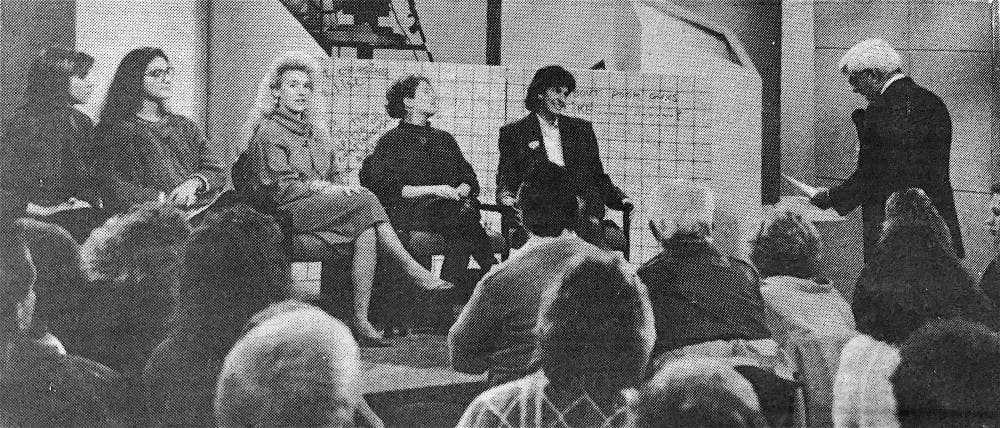Twenty-five years ago today, several students appeared on “The Phil Donahue Show” to discuss controversy surrounding campus sexual assault, including a “rape list” on library bathroom walls, The Herald reported at the time.
To protest what they perceived as University inaction on campus sexual assault, women wrote the names of alleged male rapists on bathroom walls in the Rockefeller Library in fall 1990. The University painted over the names several times, and soon the “rape list” made national headlines.
Sexual assault activists told The Herald at the time that they believed the University was more concerned with protecting the rights of male students accused of sexual assault than with supporting sexual assault survivors and making campus safer.
NBC bussed about 40 students to its New York studio for the taping of “The Phil Donahue Show” on Nov. 29, 1990. Featured panelists on the show included Lisa Billowitz ’91, Jesselyn Brown ’92, Jenn David ’91, Kristin Lahiff ’91 and Toby Simon, then-assistant dean and director of health education.
Donahue told the studio audience that “the graffiti was a powerful political idea for women who felt powerless and patronized by school officials,” The Herald reported. To set the scene, the studio was decorated with faux bathroom walls covered in graffiti.
Billowitz said the list was “not an ideal solution — just a desperate measure” and that “women would prefer to use the disciplinary system” at the University.
“If people think writing on the wall is ludicrous, I think it is ludicrous that when a man pleads guilty to rape the only punishment for him is that he has to write the victim — or I prefer to say survivor — an apology note,” Brown said.
As the only administrator on the panel, Simon took the brunt of criticism of the University from Donahue, panelists and the audience. Defending the University’s actions, Simon said the administration had already taken steps over the summer to address sexual assault policy reform, including hiring an “outside consultant,” before the creation of the list.
“We are prepared with a list of recommendations. We are prepared to implement change,” Simon said. But she noted that she was not acting as a University spokesperson, adding that she sometimes disagreed with the actions of other administrators.
Donahue said the “publicity has embarrassed Brown,” adding, “It suggests Brown is teeming with male predators.”
But audience members and panelists expressed disagreement.
“Independent thinkers is what Brown is about,” Simon said in response. “I’m not embarrassed about the attention.”
The show was broadcast to about 7 million people on Dec. 4, 1990.
The incident returned to prominence last fall, when the New York Times published an op-doc entitled “Brown’s ‘Rape List,’ Revisited,” a short film created by Julia Liu ’06 and Alison Klayman ’06.
In the film, Brown, one of the activists, described the campus response to the list. “In addition to professors calling us ‘magic marker terrorists,’ the men started a counter list of women who need to be raped,” she said. Then-Executive Vice President Robert Reichley used the phrase “magic marker terrorists” in a Nov. 22, 1990 interview with the Providence Journal-Bulletin.
Then-President Vartan Gregorian published a full-page statement in The Herald on Nov. 30, 1990 advocating a more serious University approach to sexual assault, though he said taking action with graffiti was “not an acceptable substitute for either due process or justice.”
While the “rape list” endures as a notable case of campus activism surrounding sexual assault, sexual violence continues to figure as a prominent and pervasive issue on college campuses. In the Undergraduate Council of Students’ fall 2015 poll, 35.5 percent of students ranked sexual assault policy reform in their top two “hot-button” campus priorities.
“It really does make my heart sink when I see it happening again and kind of have to relive that and feel like we didn’t really make any difference,” Brown said in the Times documentary.
The University has made efforts to improve its policies over the past 25 years.
In April 2015, Brown hired Amanda Walsh as its first-ever Title IX program officer. Later that month, the Sexual Assault Task Force recommended the creation of a Title IX Office, which formed over the summer. The task force also suggested “implementation of an overarching University policy on sexual and gender-based harassment, sexual violence, relationship and interpersonal violence and stalking.”





